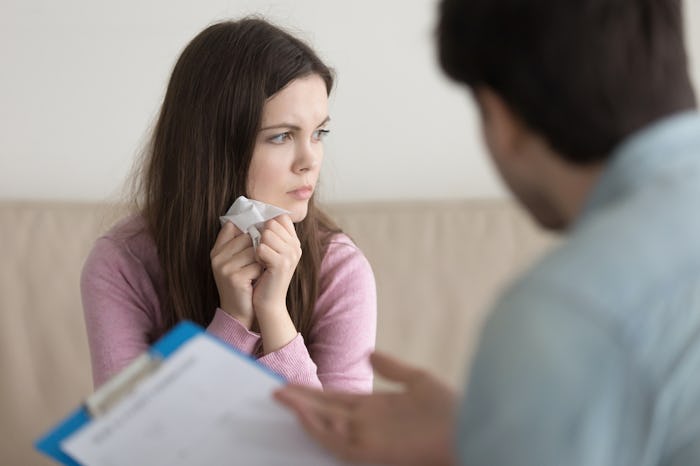Life
Study Finds Many Doctors Aren't Talking To Cancer Patients About The Risk Of Infertility
For those facing cancer diagnoses, getting treatment and getting better usually takes top priority, while other life events quickly dropping rank. But, what a surprising number of patients are finding after their successful treatments are over is that they then face new, unexpected problems with infertility — issues that they weren’t warned about prior to treatment. According to a new study, doctors aren’t discussing fertility issues with cancer patients frequently enough, and it’s leaving too many women in the dark.
The study, which was published in Psycho-Oncology earlier this month, reviewed 23 previous studies (which were carried out in seven different countries between 2007 and 2016) to glean information on the kind of discussions oncologists were having with their patients.
As HuffPost reported, the researchers involved found that, of those studied, up to half of the cancer patients of reproductive age hadn’t received enough information regarding the impact treatment might have on their fertility.
“When we look at studies of regret after cancer treatment one area that is always mentioned is reproductive regrets,” Dr. Don Dizon, clinical co-director of gynecologic oncology at the Massachusetts General Hospital Cancer Center, told Reuters recently. “Women come back and say they never got the chance to discuss their fertility and now it is gone.”
According to the American Cancer Society, most chemotherapy drugs can damage a woman’s eggs, as can radiation therapy, some forms of surgery, and hormone therapy. Despite the risks to women’s fertility, studies have found that female cancer patients tend to be given less fertility information than their male counterparts are, especially if they’re not married or if they already have children.
The disparity is apparently high enough that the American Cancer Society tells readers online that they “may need to start this conversation” with their doctors if they would like to have children in the future.
There are several options available to women who want to preserve their ability to have a child, including egg and embryo freezing. But for too many women, that discussion simply doesn’t take place before treatment. As 33-year-old Naomi Sneade, who beat cancer three times in four years, told The Telegraph last year:
I was so swept up in it all, I don’t remember thinking about fertility — let alone asking about it. … I only found out about egg freezing when it was too late. You put your faith in the doctors to tell you everything: they drum into you what the side-effects will be, but nobody speaks about what life will be like after treatment — if you make it. … There needs to be a system in place for women to be offered every option available to safeguard their chances of having a child. I feel robbed of that choice.
If the choice were between having a child and beating cancer, most women would probably take the latter. But, fortunately, it doesn’t have to be an either-or situation. And it’s time more doctors let women know all of their options before it’s too late.
